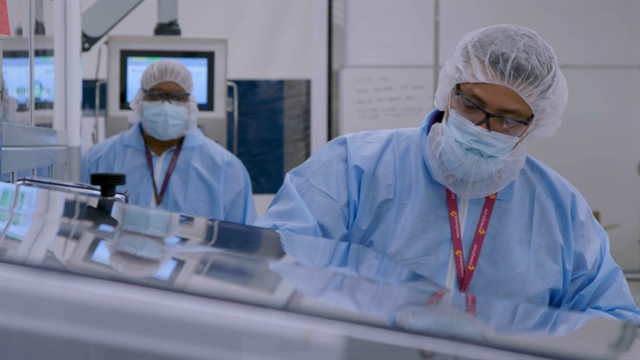 Society
Society


|
| An AstraZeneca production and manufacture facility. Photo Courtesy of AstraZeneca Vietnam |
HCM CITY — An additional 2,060 people received the Oxford/AstraZeneca COVID-19 vaccine on March 22, increasing the total to 36,082 people, the National Expanded Programme on Immunisation said on Tuesday morning.
Vaccines were given to health officials on the frontlines against the pandemic, including doctors and nurses treating COVID-19 patients, medical workers who collect clinical samples and test for COVID-19, contact tracers, and members of community anti-COVID-19 groups.
The vaccinations were given in 16 provinces and cities: Hải Dương, Hà Nội, Hải Phòng, Hưng Yên, Bắc Ninh, Bắc Giang, Hòa Bình, Hà Giang, Điện Biên, Đà Nẵng, Khánh Hòa, Gia Lai, HCM City, Bà Rịa Vũng Tàu, Bình Dương and Long An.
The Hà Nội Department of Health said that all people receiving the vaccine were healthy as of March 22. It is expected that vaccinations will continue next week as scheduled.
Đặng Đức Anh, director of National Institute of Hygiene and Epidemiology and head of the National Expanded Programme on Immunisation, said that post-vaccination reactions in Việt Nam were at the permitted threshold.
The rate of post-injection reactions observed in Việt Nam is within the recommendations from the manufacturer as well as those of the World Health Organisation (WHO).
Vaccinations began on March 8, using doses from the first batch of 117,000 doses of Oxford/AstraZeneca that arrived in the country on February 24.
According to a press release from AstraZeneca, which is a global, science-led biopharmaceutical company, the AstraZeneca US Phase III trial of AZD1222 on March 22 demonstrated statistically significant vaccine efficacy of 79 per cent at preventing symptomatic COVID-19 and a 100 per cent efficacy at preventing severe disease and hospitalisation.
This interim safety and efficacy analysis was based on 32,449 participants with 141 symptomatic cases of COVID-19.
Vaccine efficacy was consistent across ethnicity and age. Notably, in participants aged 65 years and over, vaccine efficacy was 80 per cent.
About 20 per cent of participants were 65 years and over and about 60 per cent had co-morbidities associated with an increased risk for progression of severe COVID-19, such as diabetes, severe obesity or cardiac disease.
This AstraZeneca-led US Phase III trial included two doses administered at four-week intervals. Previous trials have shown that an extended interval of up to 12 weeks demonstrated greater efficacy, which was also supported by immunogenicity data.
This evidence suggests administration of the second dose with an interval longer than four weeks could further increase efficacy and accelerates the number of people who can receive their first dose.
The vaccine was well tolerated, and the independent data safety monitoring board (DSMB) identified no safety concerns related to the vaccine.
The DSMB conducted a specific review of thrombotic events, as well as cerebral venous sinus thrombosis (CVST) with the assistance of an independent neurologist.
The DSMB found no increased risk of thrombosis or events characterised by thrombosis among the 21,583 participants receiving at least one dose of the vaccine. The specific search for CVST found no events in this trial.
Ann Falsey, professor of medicine at the University of Rochester School of Medicine in the US, and co-lead principal investigator for the trial, said: “These findings reconfirm previous results observed in AZD1222 trials across all adult populations, but it’s exciting to see similar efficacy results in people over 65 for the first time. This analysis validates the AstraZeneca COVID-19 vaccine as a much-needed additional vaccination option, offering confidence that adults of all ages can benefit from protection against the virus.”
Mene Pangalos, executive vice president of BioPharmaceuticals R&D, said: “These results add to the growing body of evidence that shows this vaccine is well tolerated and highly effective against all severities of COVID-19 and across all age groups. We are confident this vaccine can play an important role in protecting millions of people worldwide against this lethal virus. We are preparing to submit these findings to the US Food and Drug Administration and for the rollout of millions of doses across America should the vaccine be granted US Emergency Use Authorization.”
AstraZeneca will continue to analyse the data and prepare for the primary analysis to be submitted to the US Food and Drug Administration for Emergency Use Authorization in the coming weeks. In parallel, the primary analysis will be submitted for publication in a peer-reviewed journal.
Nitin Kapoor, chairman and general director of AstraZeneca Vietnam, said: “This great news once again confirms the high efficacy and good toleration of our vaccine, including for Asian people which made up 4 per cent of this large clinical trial participant pool.” VNS




